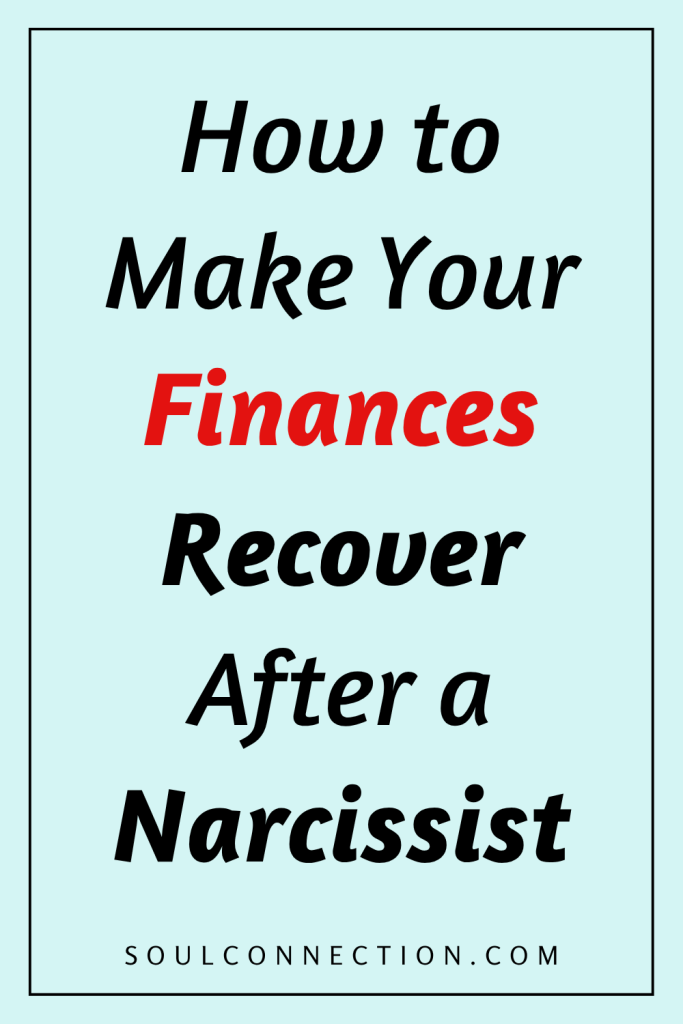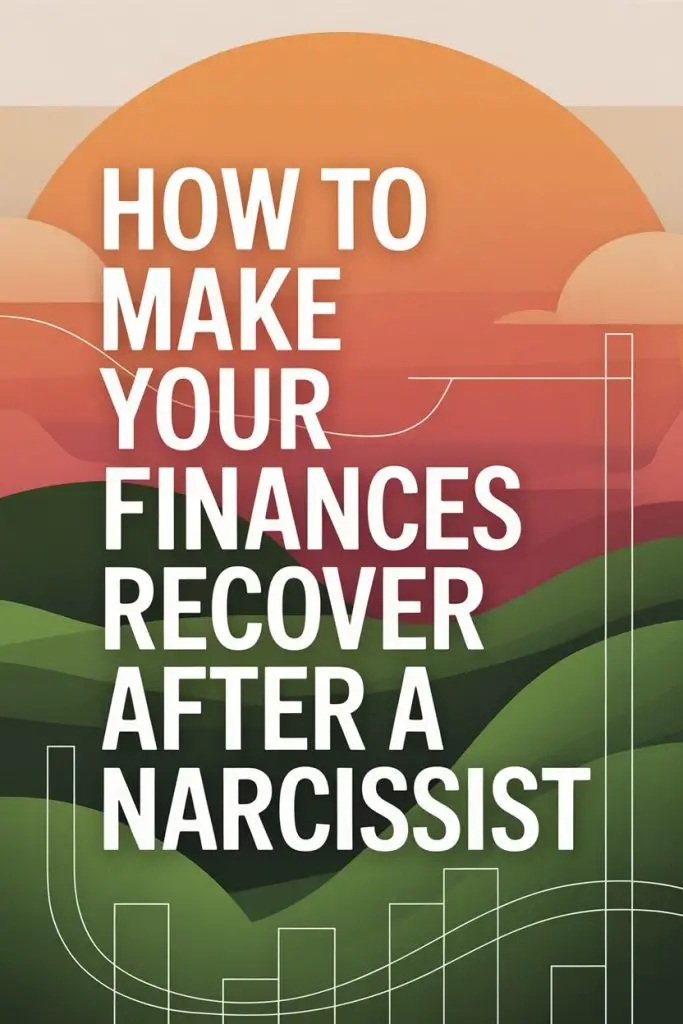Escaping a relationship with a narcissist might seem like your big “Eat Pray Love” moment, except the only prayer you’re muttering is for your bank account to miraculously bounce back from the brink.
Finances in shambles? Welcome to the club nobody asked to join. Luckily, rebuilding is possible—and it doesn’t require a secret offshore account or a winning lottery ticket.
Pull up a chair, shake out your wallet, and prepare for a sensible, sarcasm-laced guide to getting your money (and your sanity) stitched up and back in working order.
Taking Stock Without the Panic Attack
Denial is a lovely vacation spot, but nobody gets rich there. Time to face your numbers, no matter how ugly.
Open every bank, credit card, and loan statement you can find. Dig out old emails if you must. Tallies of debts, missing savings, or mysterious subscriptions your ex “forgot” to cancel may inspire some colorful vocabulary.
If a spreadsheet feels too grown-up, an old-fashioned notebook works. The point: see exactly what you have, what you owe, and what still has your ex’s name hanging around like a bad smell.
Untangling the Financial Spaghetti
Joint accounts, shared bills, and subscriptions to four streaming services “for the kids” don’t unlink themselves. Contact banks and credit card companies to remove the ex’s access—or yourself, if it was their account.
Cancel, transfer, or refresh every single login. Don’t forget the sneaky stuff: cloud storage, Amazon Prime, grocery delivery, that gym membership you always meant to use.
If the narcissist is still texting you about “forgotten” bills or threatening credit score ruin, keep it in writing. Screenshots are your new best friend.
Legal advice may be needed if things get spicy—think of it as a spa day for your financial future.
Redefining Your Budget (Yes, You Really Need One)
Budgeting after a narcissist is not about punishment; it’s about control. Yours, not theirs. Basic needs first: housing, utilities, groceries, transport.
The rest? Think Marie Kondo with your spending—if it doesn’t spark joy or keep you alive, it goes.
Be brutally honest: how much is coming in, and what absolutely must go out? Don’t budget for “someday” scenarios or zombie apocalypse-level emergencies (unless you live in Florida).
Just focus on this month, then rinse and repeat. Apps can help, but a pad and pencil plus a bit of swearing works, too.
Dealing with Debt (A Love Letter to Your Future Self)
Debt after a narcissist is almost a rite of passage. High-interest credit cards? Loans you never signed up for but somehow landed in your lap?
Time to sort your priorities. List debts by interest rate or soul-crushing-ness.
Call your lenders. Be honest—no need to air the entire relationship laundry, but ask for hardship plans, lower interest rates, or payment pauses.
Most companies would rather get paid slowly than not at all. If the debt is overwhelming or includes fraud, a nonprofit credit counselor can help you figure out the best path out of the jungle.
Credit Report Triage
Once the dust settles, your credit report might look like it’s been through a blender. Head to your region’s free credit report provider and check for errors, weird charges, or accounts you never opened.
Dispute anything that looks off. Fraud alerts and credit freezes aren’t just for the paranoid—they’re smart moves if your ex enjoyed “borrowing” your identity.
Don’t be embarrassed by a low score. It’s not a reflection of your worth—unless you plan to date your credit rating, which I strongly advise against.
Setting Boundaries, This Time With Your Money
Narcissists hate boundaries more than a toddler hates bedtime. Protecting your finances means new habits: no more shared PINs, every account in your name, and two-factor authentication everywhere. Set up alerts for every transaction.
If your ex is still in your social orbit (co-parenting, anyone?), keep all money chats to email or text.
Your money, your rules. Anyone who says otherwise can take a number.
Emergency Funds Aren’t Just for Rich People
Saving anything after financial destruction can feel like trying to fill a bathtub with a teaspoon. Start with whatever you can. Even €10 a week is better than nothing.
Emergency funds are how you keep future narcissists (or life’s regular disasters) from knocking you flat again.
Stash this money where it’s hard to access impulsively. If you’re tempted to dip in for “just one treat,” put it in an online bank with no debit card. Out of sight, out of “accidentally buying a third air fryer.”
Earning More Without Losing Your Soul
Burned out? Job looking iffy? Now’s the time for honest self-assessment. Maybe it’s freelancing on weekends, picking up a shift, or even selling the mountain of “shared” stuff your ex left behind (who needs three blenders, anyway?).
If work feels impossible, look into government resources, food banks, or local charities. There’s no shame in accepting help. Your future self will thank you for refusing to white-knuckle it alone.
Legal Wrangling Isn’t Just for the Kardashians
Some debts aren’t yours, but the narcissist’s name is nowhere to be found. If you’re stuck with unpaid bills, fraud, or property disputes, get legal advice.
Many regions offer free or discounted consultations for survivors of financial abuse.
Legal letters fix problems faster than angry texts ever could. Think of it as hiring a bouncer for your bank account.
Rebuilding Trust (With Yourself, Not Just Bankers)
Narcissists are expert gaslighters. If you’ve made financial mistakes, that doesn’t make you a fool—just human. Forgiving yourself is harder than fixing a spreadsheet.
Allow yourself the grace to be learning. No one comes out of this sort of mess with a diploma in “Advanced Adulting.”
Treat small wins—paying a bill on time, saving a tenner—as the victories they are. Champagne optional but encouraged.
When Therapy Costs Less Than Your Last Latte Habit
Financial trauma is real. If you’re waking up at 3 a.m. reliving arguments about “wasting money,” consider a therapist or support group.
Many offer sliding scales or free peer counseling. Anxiety isn’t a budgeting tool. Unlearning your ex’s money-shaming takes time and support.
If therapy sounds out of reach, online forums and books can be a lifeline. Your brain deserves a tune-up as much as your credit.
Teaching Your Kids (Without Passing On the Panic)
If kids are involved, they’ve likely seen more drama than any soap opera. Explain money basics without dragging your ex through the mud (tempting as it may be).
Teach them about saving, needs versus wants, and what healthy boundaries look like—even at the dollar store.
Modeling honesty and resilience is the best antidote to financial chaos. If nothing else, they’ll learn early how not to fall for wallet-hijackers in their own future.
When Recovery Feels Like a Slog
Setbacks will happen. You’ll want to scream, cry, or run away to live with goats in the mountains. Totally normal. Progress isn’t linear, and recovery never happens fast enough for anyone’s taste.
When motivation fizzles, go back to your “why.” Maybe it’s peace, security, or just not having your ex’s voice in your head every time you swipe your card. Keep moving—one boring, practical step after another.
Moving Forward With Money (And Grit)
Piecing your finances back together after a narcissist isn’t a plot twist anyone wants. There will be days when you want to torch the whole system and start anew, but every step—no matter how tiny—counts.
Your money story gets a rewrite now, one where you’re the hero. Dust off your hands. Pour yourself a cuppa.
The best bit? Nobody’s standing between you and your hard-earned cash ever again.


